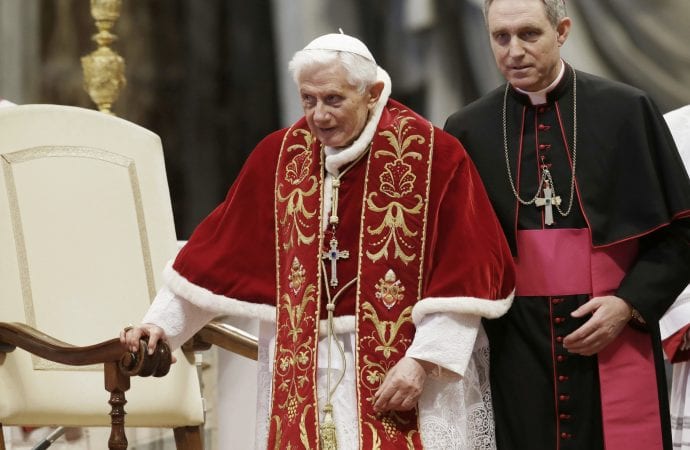In one of his most extended public statements since his resignation more than six years ago, Pope emeritus Benedict XVI has ascribed the clerical sexual abuse scandals to the sexual revolution of the 1960s and a post-Vatican II “collapse” in Catholic moral theology.
Most basically, Benedict argues that the scandals reflect a decline in faith in a personal God.
“Why did pedophilia reach such proportions? Ultimately, the reason is the absence of God,” he wrote. “We Christians and priests also prefer not to talk about God, because this speech does not seem to be practical.”
Reflecting on early struggles in the Vatican to cope with the abuse scandals, Benedict said one problem was an exaggerated “guarantorism” in Church law that put such an emphasis on the due process rights of accused parties that “convictions were hardly possible.”
It was only with time, he said, that imposing permanent penalties on abuser clergy became accepted, recognizing “it is not only the right of the accused that is important and requires a guarantee. Great goods such as the faith are equally important.”
The emeritus pope’s comments come in a 6,000-word essay written for Klerusblatt, a monthly magazine for clergy distributed mostly in his native Bavaria region of Germany.
He said he was motivated to write by the Feb. 21-24 summit convened by Pope Francis on the abuse scandals for the presidents of bishops’ conferences from around the world, and that he sought the permission of both Francis and Italian Cardinal Pietro Parolin, the Vatican’s Secretary of State, before going public with his thoughts on “what I could contribute to a new beginning.”
Benedict begins by surveying the cultural landscape in the German-speaking world after the upheavals of 1968, describing the rapid introduction of sexually explicit materials in public education and then in society at large - which, among other things, he said, promoted violence.
“That is why sexual films were no longer allowed on airplanes,” he recalled, “because violence would break out among the small community of passengers.”
In general, he said the rapid abandonment of traditional norms post-1968 made today’s pedophilia scandals possible.
“Part of the physiognomy of the Revolution of ‘68 was that pedophilia was then also diagnosed as allowed and appropriate,” he wrote. “The extensive collapse of the next generation of priests in those years and the very high number of laicizations were a consequence of all these developments.”
Benedict said the sudden adoption of a new sexual ethos was felt inside the Church.
“In various seminaries homosexual cliques were established, which acted more or less openly and significantly changed the climate in the seminaries,” he wrote. (He said this was part of a broader push to reject tradition and fashion a new ‘Catholicity,’ implying that while an openly gay lifestyle was now accepted in seminaries, “students caught reading my books were considered unsuitable for the priesthood. My books were hidden away, like bad literature, and only read under the desk.”)
In Catholic intellectual life, he wrote, the impulses of the 1960s led to a rethinking of moral theology. After early efforts to replace the traditional concept of natural law with a morality based entirely on Scripture failed, he said, what arose was a form of consequentialism that rejected the idea of absolute good or evil.
One expression of that mentality, he said, came with the “Cologne Declaration” of 1989. Signed by 163 theologians from Germany, Austria, Switzerland and the Netherlands, that statement complained of a “new Roman centralism” under St. John Paul II and an inflation in the scope of papal infallibility. It was signed by many of the leading Catholic theologians of the time, including Eduard Schillebeeckx, Johann Baptist Metz, Hans Küng, Norbert Greinacher and Ottmar Fuchs. Others signed later, most prominently moral theologian Bernard Häring.
In response to those currents, Benedict said, John Paul II issued the 1993 encyclical Veritatis splendor, insisting that “the moral calculus involved in balancing goods must respect a final limit.”
“There are goods that are never subject to trade-offs,” Benedict said, insisting that the teaching authority of the Church can and must speak definitively on moral matters.
“Those who deny the Church a final teaching competence in this area force her to remain silent precisely where the boundary between truth and lies is at stake,” Benedict wrote.
In a section of the essay devoted to “guarantorism” in Church law and what he saw as an exaggerated accent on the rights of the accused, Benedict suggested that mentality developed out of a push to shield theologians from interventions by ecclesiastical authorities.
Benedict also conceded that during his time as prefect of the Congregation for the Doctrine of the Faith, dealing with all the abuse cases arriving in Rome “went beyond the capacities” of his office, resulting in delays and leading Francis to pursue “further reforms.”
In terms of a path forward, Benedict said that “only obedience and love for our Lord Jesus Christ can point the way.”
“A paramount task, which must result from the moral upheavals of our time, is that we ourselves once again begin to live by God and unto Him,” Benedict wrote. Such a revival of the faith, he said, must begin with deeper reverence for the Holy Eucharist.
“The way people often simply receive the Holy Sacrament in communion as a matter of course shows that many see communion as a purely ceremonial gesture,” he wrote. “What is required first and foremost is the renewal of the faith in the reality of Jesus Christ given to us in the Blessed Sacrament.”
Benedict quotes a survivor who once told him that her abuser, a chaplain, would introduce the abuse he committed with the words: “This is my body which will be given up for you.”
“It is obvious that this woman can no longer hear the very words of consecration without experiencing again all the horrific distress of her abuse,” Benedict wrote. “We must do all we can to protect the gift of the Holy Eucharist from abuse.”

